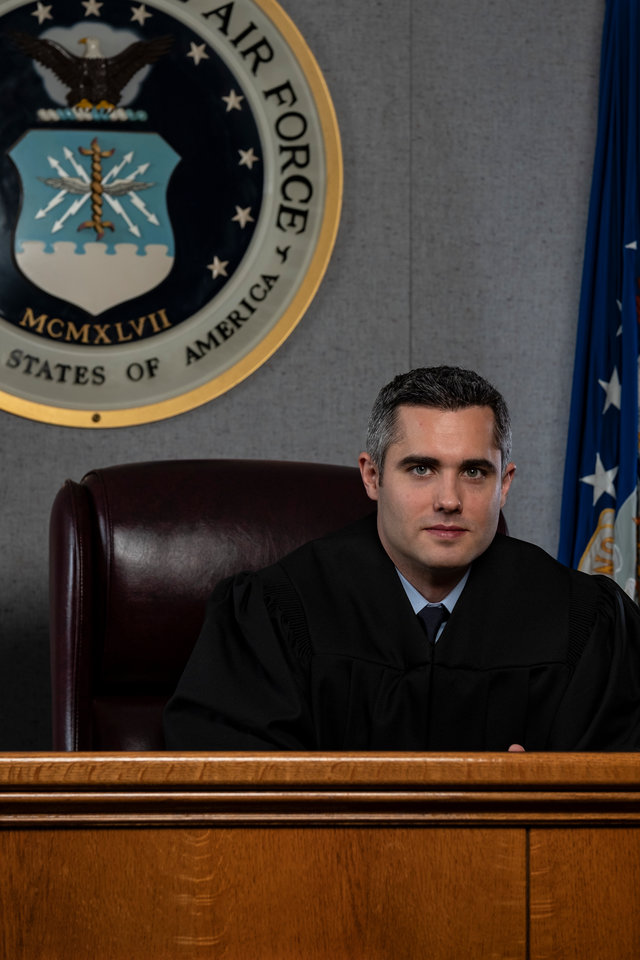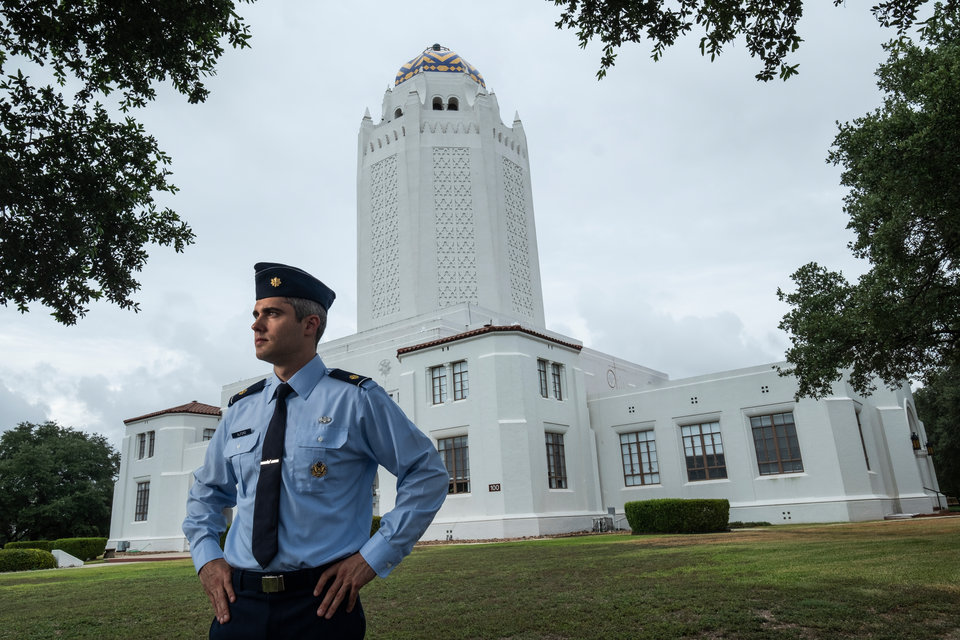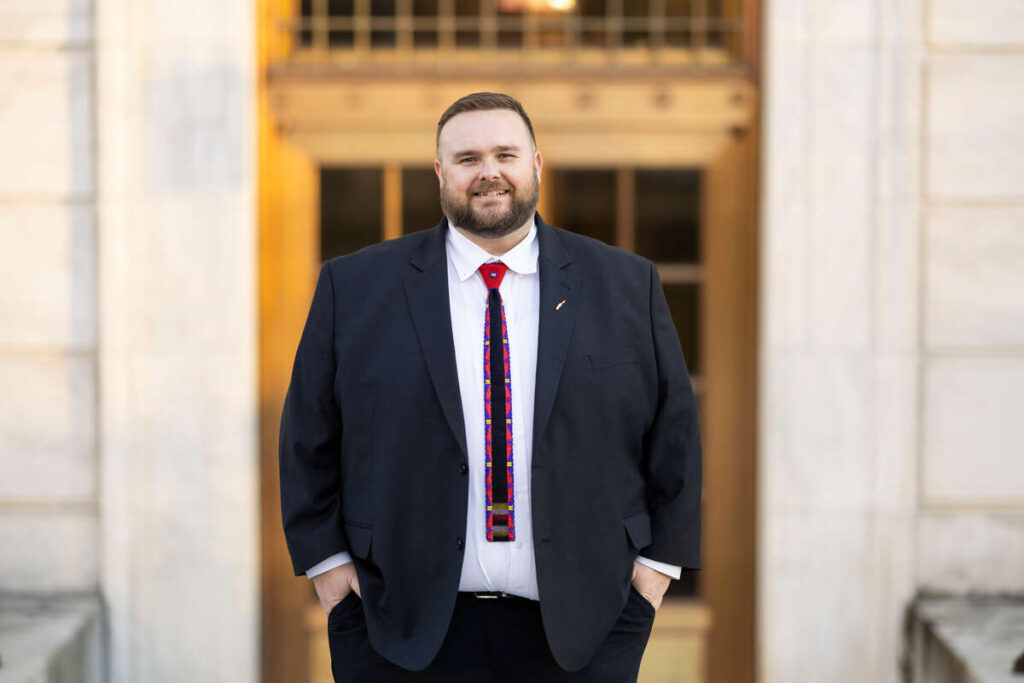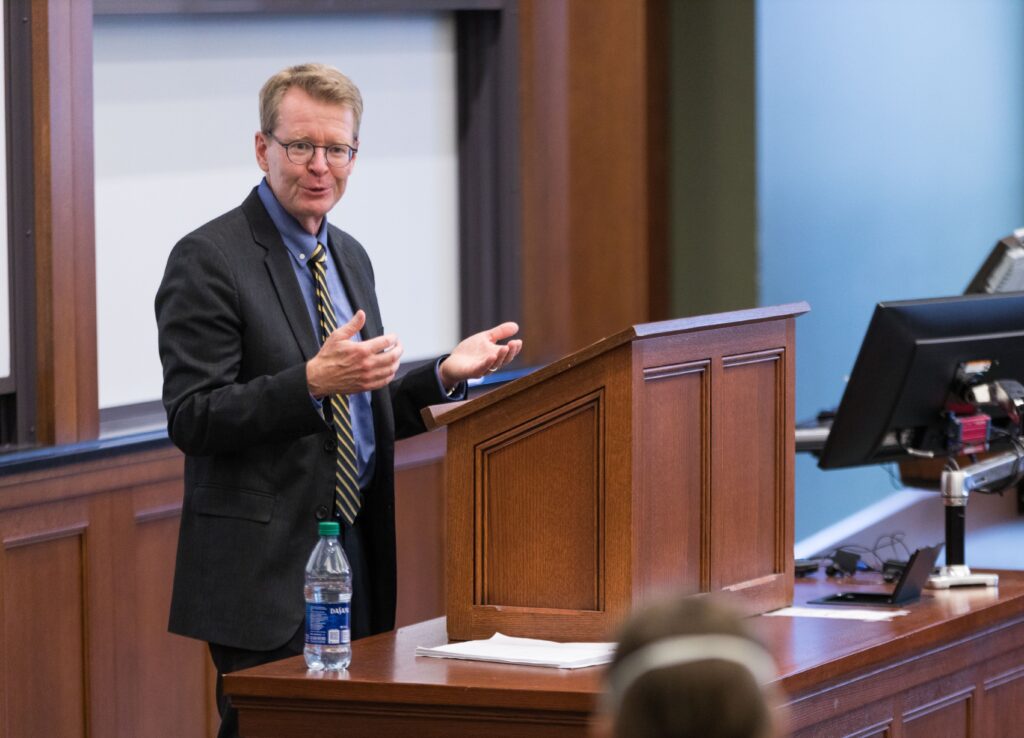Tom Alford ’07 J.D. wanted to serve the higher good in his career, but was unsure where to start. His search for the answer kicked off a meteoric career.
“Try to conceptualize the greatest good you can accomplish. For me, I looked to my heroes,” Alford said.
Those heroes were his father and grandfather, who served in the Vietnam War and World War II, respectively. Hearing about their experiences made those men seem larger than life, Alford said. His father died in 2007, shortly after Alford graduated from St. Thomas Law, and he decided his higher good was to serve his country through the armed forces.
“I was a Minnesota boy, hadn’t traveled much. I decided I was going to go out on this adventure and see what happened,” Alford said.
A decade-and-a-half later, Alford is now the one who’s larger than life. Jacob Behmer ’18, who is entering the Air Force this year, described Alford as “a legend” in the military legal field. And with good reason: Since entering the Judge Advocate General’s (JAG) Corps after law school, Alford has built a career of advocacy, quickly climbing the legal ladder and most recently being assigned as a federal judge in the Air Force’s Central Circuit. In accepting the assignment, Alford is one of the youngest – if not the youngest – federal judges in the military system. It is an extremely rare assignment for a major.
“He has had a truly spectacular career to date and is probably the finest appellate advocate in the Air Force right now,” said St. Thomas Law Professor Robert Delahunty.
Everyone Needs an Advocate
Alford’s professional years have been a powerful mix of fortune, talent and hard work. Those latter characteristics were visible throughout Alford’s academic career as he grew up in Mendota Heights, attending St. Thomas Academy for middle school and high school, then studying economics at the University of St. Thomas for his undergraduate degree. He was drawn to the legal and policy aspects of economics, and soon decided to be an advocate for others as a trial lawyer. At the School of Law, a growing understanding of everyone’s need for an advocate shaped his path.

Judge Advocate General's Corp Tom Alford ('07 JD) sits in the court room in the Administration Building at Randolph Air Force Base in San Antonio.
“Law school made me realize there are two sides, at least, to any issue. Very rarely is something black and white,” Alford said. “If someone, say an accused, is in this situation [in the courtroom], you have to be able to look at things and analyze them from different perspectives. That’s what law school did for me. St. Thomas’ social justice component was a call for me to a higher good – serving the country – but also to my career in advocacy.”
Since joining the JAG Corps in 2008, Alford has found himself in just about every situation of advocacy an attorney could ask for: He has served as lead counsel in more than 40 litigated criminal trials in both defense and prosecution roles; served a tour in Qatar as a defense attorney, where he represented the United States before the Air Force Court of Criminal Appeals and the U.S. Court of Appeals for the Armed Forces; and as a civil litigation attorney in the Environmental Law and Litigation Division of the Air Force Legal Operations Agency.
Alford said as much as he enjoys the aspects of advocacy in courtroom jury trials, he’s equally passionate about appellate work.
“Particularly criminal law – I’m a nerd when it comes to that,” he said. “I’ve always loved constitutional law and criminal procedures, and that’s the bread and butter of being an appellate lawyer.”
As an appellate lawyer Alford had the opportunity to argue many cases at the highest court in the military armed forces, the U.S. Court of Appeals for The Armed Forces.
Superfund Cases
In 2013, after five-plus years as a trial lawyer, Alford began thinking about different options, including whether he would remain in the JAG Corps. Wanting to diversify his experience, he applied and was accepted for a Corps program that paid for a master of laws degree. After more than half a decade away, he was back in the classroom, this time at George Washington University Law School, where he studied environmental law and government contracts, earning his LL.M. degree with honors. The program assigns areas of studies, so while Alford listed environmental law as a preference, it was a completely new legal field for him.
“It was challenging, but it was a good thing. I don’t know exactly how that dot will be connected later in my life ... but it did make me a better lawyer and advocate,” he said. “You’re using parts of your brain you aren’t using in different areas of the law.”
Alford’s follow-up assignment was as a special assistant to the U.S. Attorney General in the Department of Justice, which is responsible for most of the litigation in which the federal government engages. In that role, Alford focused mainly on cases tied to Superfund, a federal program stemming from the 1980 Comprehensive Environmental Response, Compensation, and Liability Act dedicated to funding the cleanup of hazardous sites and materials.
“It was great to see the policy end of things,” Alford said. “And other than the JAG Corps, the DOJ has the smartest lawyers I’ve ever met.”
Speaking to the friendly rivalry between branches of the military and government, Alford said he is proud being part of the JAG Corps.
“I’m always struck by the talent in the JAG Corps. There are really talented people here, particularly advocates,” he said. “And just like in any other area of life where there’s competition, it makes you want to be better. It makes you want to bring your A-game.”
Along with appreciating the talent around him, Alford has made a point of helping fellow talented Tommies start their own path of military advocacy.
“He took the time to talk to me about my interest in joining the JAG Corps even though he had not met me. He explained the work, the application process, the summer experience, and gave advice on law school. He did not have to do any of this, but he genuinely cared,” Behmer said. “In large part to his help and advice, I have been accepted to Navy JAG Corps upon graduation. I hope to follow the example that Tom has set in his ability to serve, perform well and put others first. St. Thomas graduates have had a good reputation in the JAG Corps, and he has played a large role in making that happen.”
Back to the Courtroom
As an Article I judge, Alford is stepping into an assignment that usually lasts about three years, although well-performing judges are pulled back to be military judges for longer appointments.
“It will be fascinating to view a case neutrally and objectively, as opposed to being an advocate,” he said. “It’s a huge honor. It’s a lot of responsibility and something to take very seriously.”
The Central Circuit is far-reaching – as far east as Illinois, as far west as Colorado and New Mexico, as far north as North Dakota and as far south as Texas. Throughout his time, Alford will be based out of San Antonio, yet one more location to call home among the many he has racked up since his adventure started in Minnesota.
“Sometimes I have to stop and reflect on that. I’ve been very fortunate,” Alford said.
There likely won’t be much time for such reflection as Alford travels 30 to 35 weeks a year around the Central Circuit. But as he prepares to become the first School of Law alumnus to be a federal judge, there is plenty to be learned from Alford’s continuing example.
“I would tell this to young students: Try to find something that you find meaning in,” Alford said. “Try to conceptualize the highest good you can think of. In my case, it was serving in the armed forces, like my heroes did. That was the best I could come up with as a 25-year-old, and I’ve drawn a lot of meaning from those experiences. Try to do something that’s bigger than yourself.”







